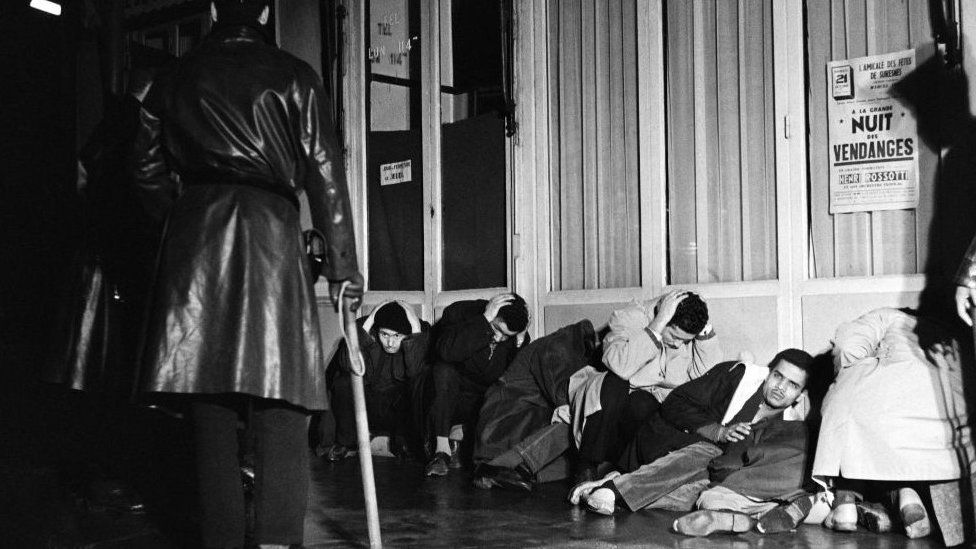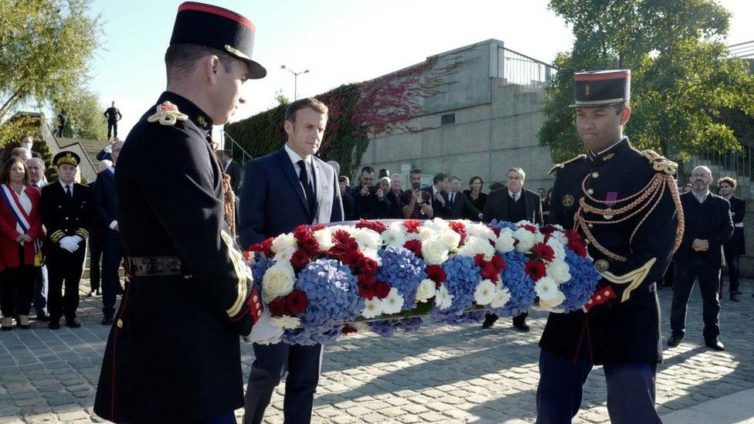French President Emmanuel Macron has called a bloody crackdown on Algerian protesters by police in Paris 60 years ago an "unforgivable crime".
On October 17, 1961, French police turned on Algerian demonstrators. Some were shot, others were drowned.
The precise number of victims is not known, but some say several hundred could have lost their lives.
Mr Macron is the first French president to attend a memorial for those killed that day.
He joined a commemoration beside the bridge over the River Seine which was the starting point in 1961 for a march against a night curfew imposed only on Algerians.
Mr Macron told relatives of victims on the 60th anniversary of the bloodshed that "crimes" were committed under the command of the notorious Paris police chief Maurice Papon. Papon was revealed in the 1980s to have collaborated with occupying Nazi forces in World War Two in transferring Jews to Nazi death camps.
The 1961 march was repressed "brutally, violently and in blood", Mr Macron's office said in a statement. Some 12,000 Algerians were arrested, many were wounded and dozens killed, it added.
But activists hoping for an even stronger recognition of responsibility were left disappointed.
Mr Macron stopped short of an apology and did not give a public speech, with the Élysée Palace issuing only the written statement.
The president's statement "is progress but not complete. We hoped for more", Mimouna Hadjam of the Africa93 anti-racism association told the AFP news agency.
"Papon did not act alone. People were tortured, massacred in the heart of Paris and those high up knew," Hadjam added, calling for recognition of a "state crime".

Historian Emmanuel Blanchard said that Mr Macron's comments represented "progress" and had gone "much further" than his predecessors.
The massacre, which happened during the war against French rule in Algeria, was denied or concealed by French governments for decades.
The first commemorations of the event were organised in 2001 by the mayor of Paris.
In 2012, then-President François Hollande said the Republic recognised that Algerians had been killed that day in a "bloody repression", and he paid tribute to the victims.
Latest Stories
-
Investigators find cockpit voice recorder from crashed Air India flight
25 minutes -
Club World Cup: Delap makes debut as Chelsea win in front of empty seats
36 minutes -
Retirement age of 70 for judges is fine – Justice Adjei
38 minutes -
Chris Brown jokes about ‘nice’ jail as he starts UK tour
49 minutes -
Juror dismissed in Diddy trial over ‘inconsistencies’
59 minutes -
Don’t allow Executive or Legislature to encroach on judicial independence – Justice Adjei
2 hours -
Bibiani Goldstars crowned champions, squad rewarded by betPawa in bonus payout
2 hours -
Capping Supreme Court judges won’t be helpful – Justice Suurbaareh
2 hours -
Mahama is Ghana’s most prepared President – Gabby Otchere-Darko
2 hours -
Samer Chedid succeeds Mauricio Alarcón as CEO of Nestlé Central and West Africa
3 hours -
Stephen Ntim takes temporary break as NPP Chairman due to health concerns
3 hours -
Abolish ‘Additional Judge’ practice in lower courts – Justice Dennis Adjei urges
4 hours -
District assembly elections are already partisan – Sir Dennis Adjei urges reform
4 hours -
Africa World Airlines reschedules Accra–Ouagadougou route launch to 1st July
4 hours -
Mahama vows to reignite dream of Bukom Boxing Academy
4 hours

